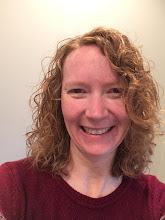So my two-year-old is at the point in his development where he is connecting different concepts together as he learns to speak. I am constantly amazed at what connections he makes.
Like last night, we were driving in the car, and he was repeating phrases from the song that was playing. So he sang things like, "new day" after the line ended. Of course he only picks out the words he really knows and understands. One line ended with the word "change." So my sweet little two-year-old sang "Change." Then he tried it again connecting it with the only way he understands the word "change": "Change diaper!" in his little sing-songy voice. Talk about hysterical!
So what does my son singing a song have to do with writing? Surprisingly, a lot. When we write, we are learning a new language, much like my two-year-old. We start out kind of slowly, doing a lot of observing and occasionally trying to mimic what we see. Then we start mimicking a lot more, trying to figure out what works and what doesn't. More importantly, we try to figure out why something works. As we get a little more confident in our writing, we start trying things out on our own, start making connections. Sometimes those connections are clear and logical, sometimes they are simply hysterical. But either way we are still trying to learn the intricacies of this new language we have adopted. (And I use "new language" purposely; you ever noticed how you cannot write the way you speak?) Eventually, if we keep working at it, we reach the point where we have mastered the basics and can start learning the details. If we continue to apply ourselves, we'll reach the point where we have mastered the entire language (like, about the time we die).
So good luck to all of you struggling to make the connections. I feel like I am finally starting to get to the point where some of those connections are working, but only in certain areas (for example, my review committee pointed out something totally lacking that I did not even realize wasn't there, but that's for another blog). But I still have a long way to go. I'm maybe a five- or six-year-old right now, but I rely on a lot of 20- or 30-year-olds to help me learn this language. Eventually, I will be one of those seasoned writers...I hope...
Like last night, we were driving in the car, and he was repeating phrases from the song that was playing. So he sang things like, "new day" after the line ended. Of course he only picks out the words he really knows and understands. One line ended with the word "change." So my sweet little two-year-old sang "Change." Then he tried it again connecting it with the only way he understands the word "change": "Change diaper!" in his little sing-songy voice. Talk about hysterical!
So what does my son singing a song have to do with writing? Surprisingly, a lot. When we write, we are learning a new language, much like my two-year-old. We start out kind of slowly, doing a lot of observing and occasionally trying to mimic what we see. Then we start mimicking a lot more, trying to figure out what works and what doesn't. More importantly, we try to figure out why something works. As we get a little more confident in our writing, we start trying things out on our own, start making connections. Sometimes those connections are clear and logical, sometimes they are simply hysterical. But either way we are still trying to learn the intricacies of this new language we have adopted. (And I use "new language" purposely; you ever noticed how you cannot write the way you speak?) Eventually, if we keep working at it, we reach the point where we have mastered the basics and can start learning the details. If we continue to apply ourselves, we'll reach the point where we have mastered the entire language (like, about the time we die).
So good luck to all of you struggling to make the connections. I feel like I am finally starting to get to the point where some of those connections are working, but only in certain areas (for example, my review committee pointed out something totally lacking that I did not even realize wasn't there, but that's for another blog). But I still have a long way to go. I'm maybe a five- or six-year-old right now, but I rely on a lot of 20- or 30-year-olds to help me learn this language. Eventually, I will be one of those seasoned writers...I hope...

Comments
Post a Comment